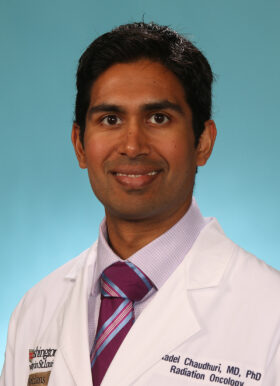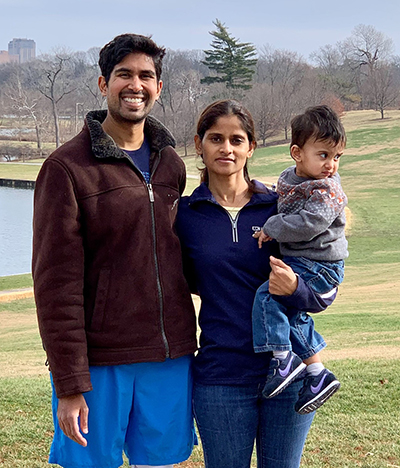Aadel Chaudhuri, MD, PhD

Aedel Chaudhuri, MD, PhD, is a radiation oncologist who specializes in thoracic oncology (lung cancer) and stereotactic body radiotherapy.
PLEASE CALL 314-653-5797 FOR AN APPOINTMENT
What happened in the course of schooling to influence you to choose your specialty of radiation oncology?
While in medical school at Stanford, I took a leave to get my PhD at Caltech. During that time I became interested in the molecular basis of medicine. After my PhD, I came back with an open mind to begin my clinicals at Stanford — because I wasn’t sure what I wanted to specialize in.
I was fascinated by a number of different subjects. Everything from internal medicine to general surgery to pediatric surgery to surgical oncology to radiation oncology. I actually didn’t learn about radiation oncology until pretty late in medical school. One day, I was in the coffee line at school, and in front of me was the program director for radiation oncology. I read her name badge and asked, “What is radiation oncology? I’m still looking for a field.”
She told me about radiation oncology and invited me to an interest group to learn more. The group was fascinating, and I then signed up for a rotation – which I really enjoyed. I followed that by doing some research in the department, and the rest is history.
I was late in choosing my specialty, but I’m glad I happened upon the field. I stayed at Stanford for my residency and was excited when I had the opportunity to join the faculty here at Washington University.

What is radiation oncology?
Radiation oncology in its simplest terms is using radiation to treat cancer. There are multiple modalities used to treat cancer: immune agents, systemic agents and surgery. Radiation is one of those agents. It is a particularly powerful agent and is something that requires special training because radiation, just like many things in medicine, is a double-edged sword. When applied properly, it can be very beneficial. But when not applied properly, it can be dangerous. That is why we go through years of training to become skilled in the art of precisely delivering radiation to treat cancer.
My practice is primarily limited to the treatment of lung cancer. I enjoy making a positive difference in the lives of my patients.
What brought you to Washington University?
Washington University is an incredible place. The radiation oncology department here is one of the best departments in the world. Our thoracic radiation oncology chief, Dr. Cliff Robinson, is someone I look up to as a gifted clinician and researcher. All of this, combined with the level of care Siteman Cancer Center gives its patients, made this quite an opportunity.
Which aspect of your practice do you find most interesting?
There are many aspects that are interesting, but the most interesting is being able to treat, with the intent to cure, early stage, non-small cell lung cancer with stereotactic body radiotherapy (SBRT). This therapy allows us to use ultra-precise and focused radiation at high enough doses to kill, and in many cases, cure the lung cancer. Using radiation as the sole modality, it allows us to successfully treat a patient in a week or less.
It gives me a lot of joy to deliver treatments, where I don’t have to use a scalpel that will potentially cure a patient’s cancer.
Can you describe your research using liquid biopsies for cancer therapies?
Liquid biopsy is an area of research in which I’m a leader and internationally renowned expert. I lead the ctDNA liquid biopsy research group here at Washington University. With liquid biopsy research, we take a biofluid, such as a blood sample or urine sample for analysis. This sample is used to predict the risk for cancer recurrence by measuring if the patient has any tumor DNA remaining in his or her body.
I envision a future where a blood test can be used to determine if a patient has cancer, or how well the tumor is responding to treatment. The blood test would also be used after treatment is complete to assess the risk of relapse.
I am very excited about liquid biopsies — they are revolutionizing our field altogether, giving us the ability to detect cancer and detect it early. They will also allow us to diagnose relapses early, which means we will be able to intervene earlier and deliver more curative treatments.
Where are you from?
I am from Salt Lake City, Utah. I grew up and went to the public school system there, MIT for college, Stanford for medical school, Caltech for grad school and returned to Stanford for residency, then came to Washington University as a faculty member.
Which particular award or achievement is most gratifying?
Each award has its own story. My most gratifying was the National Cancer Institute K08 Career Development award in 2019. It helped solidify me as a physician-scientist here at Washington University.
What is the best advice you’ve received?
The best advice I’ve received is to focus on matters of substance. Focus on my patients and do everything to treat them with care and respect. My research focuses on improving our ability to diagnose cancer relapse earlier.
If you weren’t a doctor, what would you like to be doing?
I have a cop-out answer because I’m a physician-scientist. I could just say well, I’d be a scientist. But if I wasn’t a physician or a scientist, I’d probably be a creative writer. I enjoy creativity, expanding my horizons and exploring the more artistic side of things.
What made you decide early on to go into medicine?
I love science. In my early years I was drawn to understanding how things work and exploring natural phenomena. I had supportive parents who fostered me in this direction, and was very fortunate in middle school and high school to have opportunities that confirmed my interest in science.
I had the ultimate opportunity to go to MIT after high school. It was there I saw what was possible in the scientific world and gained mentorship from people I respect very dearly. Through science I discovered medicine. I realized that the most rewarding thing of all is the application of science to the human body. When I realized that, I was totally set on being a physician, and more specifically a physician-scientist.
What do you enjoy doing for fun?
My family loves going to the zoo, playgrounds, Forest Park, the Magic House, the Butterfly House — we love going places where my 18-month-old has fun.
I personally love trail running. I love running the Katy Trail, Forest Park and Queeny Park. I also enjoy road biking, gravel biking and Pedal the Cause.